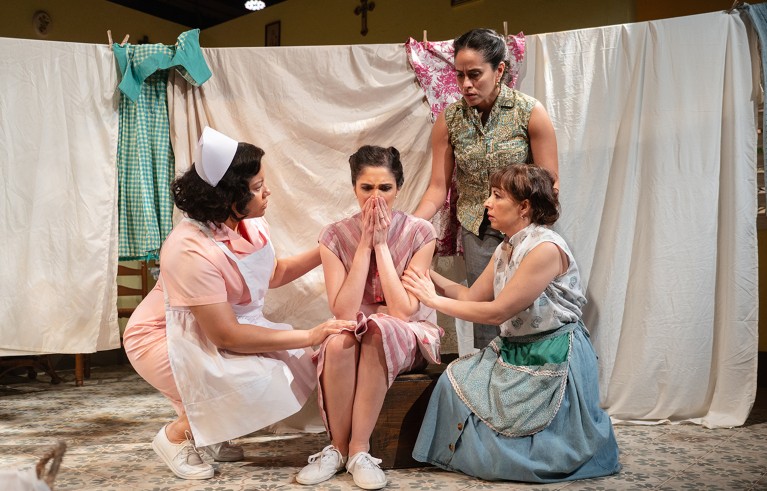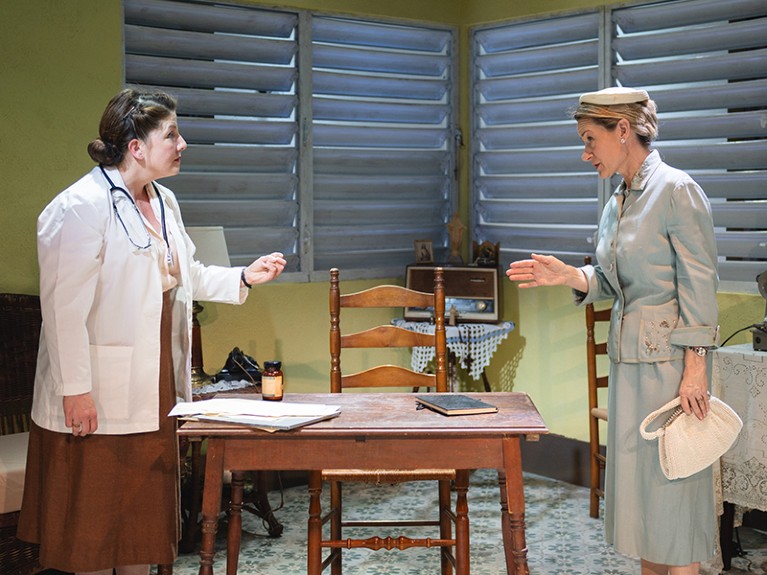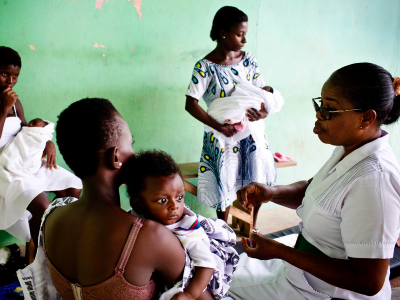[ad_1]

Las Borinqueñas explores how women sought control of their reproductive lives in the 1950s.Credit: Valerie Terranova
Las Borinqueñas Directed by Rebecca Aparicio Ensemble Studio Theatre, New York City 3 April – 5 May 2024
It’s the 1950s and two US scientists are looking for somewhere to test the first birth-control pill. Where better than Puerto Rico? The territory had an established network of family-planning clinics, and the use of contraception had been legal there since 1937. That wasn’t the case in much of the United States, including Massachusetts, where biologist Gregory Pincus and obstetrician-gynaecologist John Rock were developing the oral contraceptive.
Puerto Rican women were interested in a pill that could give them more control over their reproductive lives. But as they lined up outside a clinic in the outskirts of San Juan to receive the medication, many were unaware that it was an experimental drug and they were part of a clinical trial. When some of them started reporting debilitating side effects, these were dismissed as psychosomatic.
The play Las Borinqueñas, whose title means ‘the Puerto Rican women’, revisits the complicated history of the world’s first oral contraceptive. Mixing the excitement of scientific breakthrough with the shock of flawed research ethics and shadows of colonialism and exploitation, it puts the spotlight on the women who, after playing a key part in the pill’s development, were quickly forgotten.
Reboot contraceptives research — it has been stuck for decades
It’s a long-overdue tribute and, most importantly, a reminder to remain vigilant against abuse and disrespect in studies involving human participants. In a world where the fight for access to birth control is ongoing, it is bold and commendable to recognize that this significant advance was built on ethically problematic studies that harmed some of the very women they aimed to serve and empower.
Written by Nelson Diaz-Marcano, a Puerto Rican theatre-maker based in New York City, the show was developed by the Ensemble Studio Theatre and the Alfred P. Sloan Foundation, a research funder also based in the city. It had its world premiere on 3 April and is playing until 5 May at the Ensemble Studio Theatre in New York City.
Taking control
The play follows the intertwined lives of five women — Chavela, Yolanda, Fernanda, Maria and Rosa — as they cross paths with the researchers testing the pill. As the audience witnesses their love stories, aspirations, struggles and loyal friendships, the protagonists open a window on the lives of hundreds of Puerto Rican women who enrolled in the tests, and how the experience changed them.
Each character is affected in a different way. Chavela sees the trial as chance to slow down the growth of her family while maintaining a passionate marriage. Yolanda envisions it as the lifeline that might save other women from the fate of her sister, Fernanda, who dies as a result of an illegal abortion. For Maria, it’s about avoiding pregnancy to advance her dream of becoming a writer — and about honouring Fernanda, her soulmate, with whom she could never openly have a relationship because of societal norms. But the hope brought on by the pill slowly fades when the women start feeling unwell.

The play shows how researchers and trial facilitators played down side effects because of the pill’s ground-breaking implications.Credit: Valerie Terranova
Rosa, who was suspicious of the pill from the start, urges the others to stop taking it, while boasting about the benefits of the sterilization that she underwent after giving birth. The doctors who suggested the procedure, however, never told her it was irreversible. The heartbreaking scene when she learns she will never be able to have another baby signals that the clinical trial wasn’t the first instance of medical abuse these women endured. By 1953, a eugenics-based programme in Puerto Rico had led to the sterilization of nearly one-fifth of women on the island to address concerns about ‘surplus population’.
From rabbits to women
The birth-control pill was the result of the encounter of Pincus and Rock, who were both studying the effects of synthetic progesterone, but in different contexts. Pincus was looking into the anti-ovulatory effect of the hormone in rabbits, and Rock was exploring it as a means to treat his patients’ infertility. The play focuses on Pincus, portrayed as an ambitious scientist determined to carve his name into history by creating a revolutionary product.
I wouldn’t be a scientist without my abortion
When someone becomes pregnant, their levels of progesterone go up, signalling to the body to shut down the ovaries and not release new eggs. Whereas Pincus wanted to mimic this process for the purpose of contraception, Rock hoped that a pause in ovulation would allow his patients’ reproductive systems to reset, increasing their chances of pregnancy after the treatment.
The scientists came together to test the pill in humans. The play briefly refers to a couple of small trials done in the United States, but to get the pill approved, it had to be tested on a larger scale. Pincus sets his sights on Puerto Rico and seeks to partner with Edris Rice-Wray, who was then the medical director of the Family Planning Association of Puerto Rico.
Rice-Wray expresses her concerns about negative side effects that had been observed in previous tests, but is convinced to join the project by Pincus’s wife, who highlights the potentially revolutionary implications of the pill for women around the world.
Rice-Wray is portrayed as a responsible public-health official who is nonetheless persuaded to push the boundaries of ethics for the greater good. She launches the programme with fanfare in 1956 and, at the suggestion of Pincus, does not mention the potential side effects to participants, most of whom are poor women with little access to health care. Her discomfort with the omission increases as she hears that the trial is taking a toll on participants.
Are women in research being led up the garden path?
In one scene, Chavela is taking laundry from the line when she is struck by dizziness and nausea. Her sister Rosa warns her that the pill is to blame, but she prefers to continue taking it rather than to risk becoming pregnant again. Rice-Wray reports those concerns to Pincus, who minimizes them as minor inconveniences compared with the wider benefits of the drug. Because of his disregard for the Puerto Rican study participants, the real-life Pincus was later accused of colonialism and exploitation of women of colour.
The protagonists eventually stop taking the pill and don’t experience long-term consequences. But the play mentions that three Puerto Rican women died during the trial, and that their deaths were never investigated.
Trial and error
In reality, of around 800 women who enrolled in the study, only 130 took the pill for a year or more, most dropping out because of the side effects. To make the results look more impressive, Pincus described them by saying that no pregnancy had been registered “in the 1,279 menstrual cycles” during which the treatment had been followed. In the play, his character brushes off the accusation of data embellishment. For him, it was simply a matter of using a different metric.
The pill, branded as Enovid, went on to be approved by the US Food and Drug Administration as a contraceptive in 1960. The participants of the clinical trial didn’t have access to the product once it reached the market: the price was prohibitive for the Puerto Rican working class.
How centuries of sexism excluded women from science — and how to redress the balance
More than six decades later, the contraceptive pills available are much safer. But access is still an issue. In the United States, until last year, people still needed a prescription to buy oral contraceptives — a significant barrier for those without health insurance.
Las Borinqueñas concludes with the women refusing to be defined by the experience of being exploited by scientists and having their right to decide about their own reproductive lives stripped away. Rosa publicly denounces the pill’s side effects and the irreversibility of sterilization on a radio show; she also conveys her resilience and hope for the future. The women will continue to take care of their families, to work and to pursue their dreams. They celebrate life and laugh at adversity.
Some would argue that their suffering was a small price to pay for the wider impacts of pill. But by giving names to the study participants and telling their stories, Las Borinqueñas serves as a powerful reminder that such disregard and injustice was never acceptable.
[ad_2]
Source Article Link





